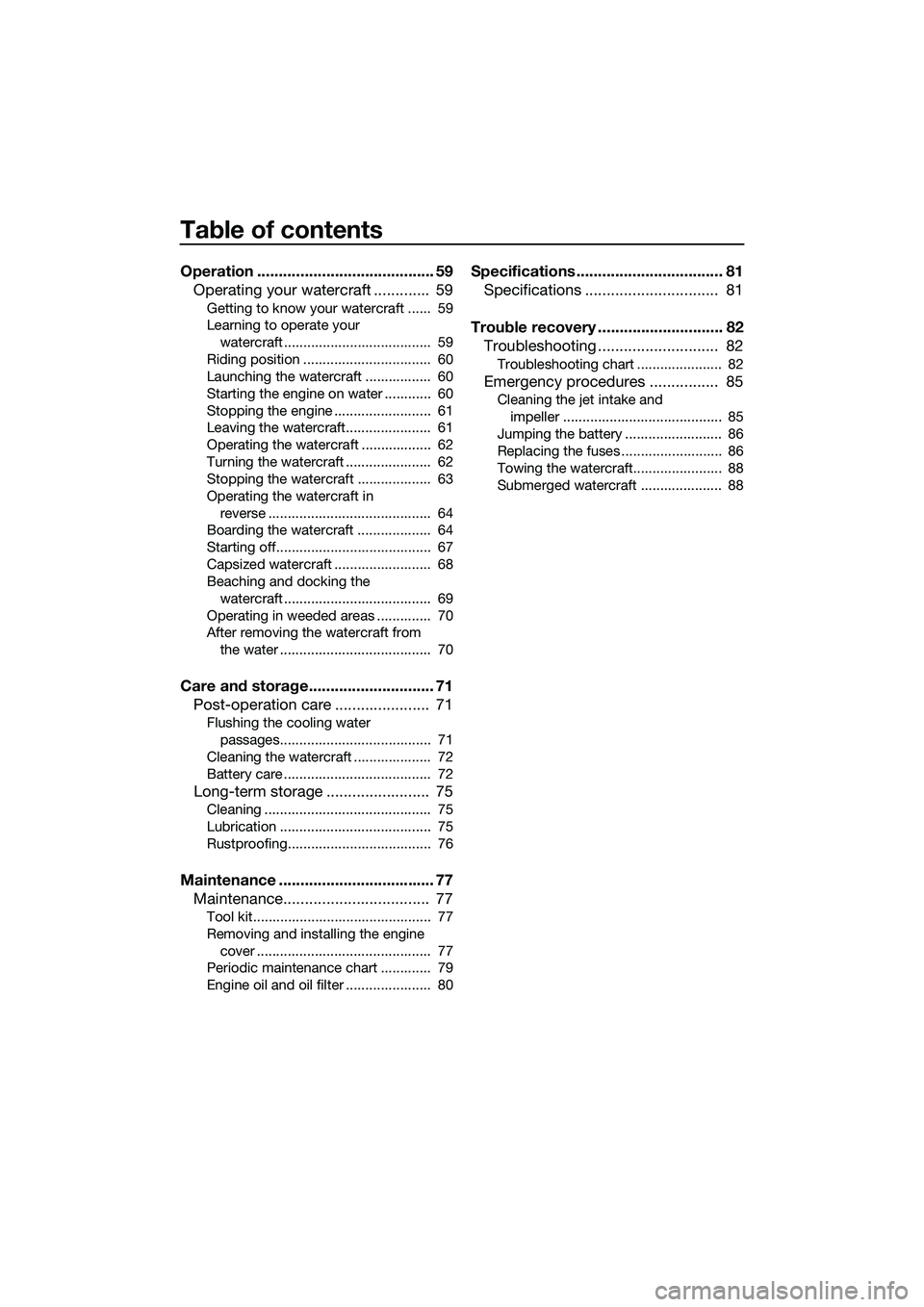Page 6 of 98

Table of contents
Operation ......................................... 59Operating your watercraft ............. 59
Getting to know your watercraft ...... 59
Learning to operate your
watercraft ...................................... 59
Riding position ................................. 60
Launching the watercraft ................. 60
Starting the engine on water ............ 60
Stopping the engine ......................... 61
Leaving the watercraft...................... 61
Operating the watercraft .................. 62
Turning the watercraft ...................... 62
Stopping the watercraft ................... 63
Operating the watercraft in reverse .......................................... 64
Boarding the watercraft ................... 64
Starting off........................................ 67
Capsized watercraft ......................... 68
Beaching and docking the
watercraft ...................................... 69
Operating in weeded areas .............. 70
After removing the watercraft from the water ....................................... 70
Care and storage............................. 71Post-operation care ...................... 71
Flushing the cooling water
passages....................................... 71
Cleaning the watercraft .................... 72
Battery care ...................................... 72
Long-term storage ........................ 75
Cleaning ........................................... 75
Lubrication ....................................... 75
Rustproofing..................................... 76
Maintenance .................................... 77 Maintenance.................................. 77
Tool kit.............................................. 77
Removing and installing the engine
cover ............................................. 77
Periodic maintenance chart ............. 79
Engine oil and oil filter ...................... 80
Specifications .................................. 81 Specifications ............................... 81
Trouble recovery ............................. 82 Troubleshooting ............................ 82
Troubleshooting chart ...................... 82
Emergency procedures ................ 85
Cleaning the jet intake and
impeller ......................................... 85
Jumping the battery ......................... 86
Replacing the fuses .......................... 86
Towing the watercraft....................... 88
Submerged watercraft ..................... 88
UF2M73E0.book Page 2 Friday, August 2, 2013 11:28 AM
Page 24 of 98

Safety information
18
Make sure that the rope is not looped
around anything.
After checking that the skier is ready and
that there is no traffic or other obstacles,
apply enough throttle to raise the skier.
Make smooth, wide turns. The watercraft is
capable of very sharp turns, which could
exceed the abilities of the skier. Keep the
skier at least 50 m (164 ft), about twice the
distance of a standard ski rope, from any
potential hazard.
Be alert to the hazard of the ski rope handle
snapping back at the watercraft when the
skier falls or is unable to get up on the skis.
Towing heavy or bulky objects other than
skiers, such as another boat or watercraft,
can cause loss of steering control and cre-
ate a hazardous condition. If you must tow
another boat in an emergency situation,
operate slowly and cautiously.
EJU30971
Safe boating rules
Your Yamaha watercraft is legally considered
a powerboat. Operation of the watercraft
must be in accordance with the rules and
regulations governing the waterway on which
it is used.
UF2M73E0.book Page 18 Friday, August 2, 2013 11:28 AM
Page 46 of 98

Equipment operation
40
EJU34873Bow eye
The bow eye is used to attach a rope to the
watercraft when transporting, mooring, or
towing it in an emergency. (See page 88 for
information on towing the watercraft.)
EJU34882Stern eyes
The stern eyes are used to attach a rope to
the watercraft when transporting or mooring
it.
EJU40421Cleat
The cleat is used to attach a ski rope to the
watercraft when pulling a water-skier.
WARNING! Do not use the cleat to lift the watercraft. The cleat is not designed to
support the watercraft’s weight. If the cleat breaks, the watercraft could fall,
which could result in severe injury.
[EWJ01511]
EJU31684
Storage compartments
This watercraft is equipped with the following
storage compartments.
The storage compartments are not designed
to be waterproof. If you carry objects that
must be kept dry, put them in a waterproof
bag.
Make sure that the storage compartments
are closed securely before operating the wa-
tercraft.
EJU31716Bow storage compartment
The bow storage compartment is located un-
der the hood.
1 Bow eye
1 Stern eye
1
1
1Cleat
1
UF2M73E0.book Page 40 Friday, August 2, 2013 11:28 AM